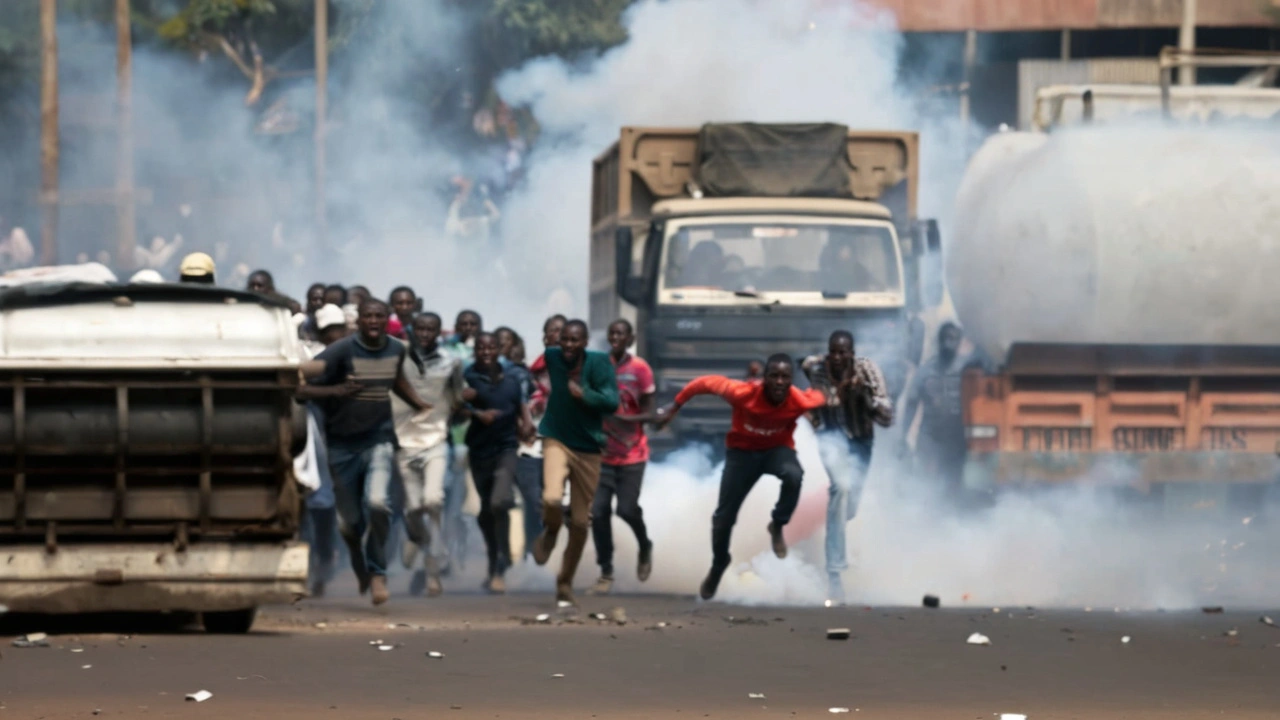Debunking the Viral Video: False Claims on Putin's Support
In recent days, a video has been spreading across various social media platforms, purporting to show Russian President Vladimir Putin declaring his support for protests in Kenya. This video has garnered significant attention and has been shared widely, leading many to believe in its authenticity. However, a closer examination reveals that these claims are entirely false. Putin did not issue any statement supporting or endorsing the protests in Kenya. This piece aims to set the record straight and delve into the implications of such misinformation.
The Origin and Spread of Misinformation
It's essential to understand how this misleading video came into existence and why it spread so quickly. The clip in question appears to be a doctored version of an unrelated speech made by Putin. Through manipulation and the insertion of false subtitles, the creators of the video have made it appear as though Putin is commenting on the situation in Kenya. Once the video hit social media, it exploited the viral nature of these platforms. Algorithms that prioritize engagement inadvertently helped in amplifying the false message, facilitating its rapid dissemination.
Investigative Findings: Unpacking the Truth
In our investigation, several key points discredit the veracity of the video. Firstly, a review of official Kremlin transcripts and statements reveals that there has been no mention of the protests in Kenya by the Russian President. Additionally, language experts and analysts pointed out discrepancies in the audio, identifying it as a poorly executed voiceover. These findings collectively debunk the notion that Putin made any supportive statements regarding the Kenyan protests.
Why Misinformation Matters
Understanding the stakes in this situation underscores the importance of debunking such myths. Misinformation can have a profound impact on public opinion and international relations. In Kenya, a country already grappling with internal strife, the feeling of external support or interference can exacerbate tensions. In Russia, it misrepresents the stances and policies of its leadership. Misinformation also erodes trust in media, which is critical for the function of democratic societies. Such falsehoods contribute to a misinformation ecosystem, making it increasingly difficult for the public to filter fact from fiction.
Role of Social Media Platforms
Social media platforms must play a crucial role in curbing the spread of false information. Platforms like Facebook, Twitter, and TikTok have mechanisms to flag and take down misleading content, but these systems are far from perfect. The balance between free speech and preventing misinformation is delicate, requiring nuanced policy approaches and improved technological solutions. Here, user education also plays a critical role. Individuals need to be aware of how to verify information and understand the tell-tale signs of doctored content.
Expert Opinions and Official Statements
Political analysts and experts have also weighed in on the issue. According to Dr. Anya Zinchenko, a professor of International Relations, the spread of such videos can be seen as a tactic to destabilize regions.

Jason Jennings
July 23, 2024 AT 22:29This whole thing is just Western media trying to smear Russia.
Diego Vargas
August 1, 2024 AT 14:29I’ve read the transcript and there’s no mention of Kenya, so the video is a clear fake.
People should check the original source before sharing.
Alex Lee
August 10, 2024 AT 06:29Fake news, enough with this propaganda.
Vida Yamini
August 18, 2024 AT 22:29It's great that you're taking the time to read through the facts instead of just scrolling past.
Misinformation spreads like wildfire when we don't pause to verify.
The video in question was clearly edited, as anyone with a basic ear can spot the mismatch.
Putin never mentioned Kenya in any of his recent speeches, which the Kremlin archives confirm.
By sharing unverified clips, we unintentionally feed the same narratives that aim to divide.
Think about the impact on Kenyan citizens who are already dealing with real challenges.
They deserve truthful information, not sensationalized drama.
Social platforms have a responsibility to flag such content quickly.
Users also have a role, learning to spot deepfakes and checking subtitles.
A simple way is to compare the audio with known speeches on official channels.
If something feels off, it probably is.
Remember, critical thinking is a muscle that gets stronger with practice.
Encourage your friends to question before they forward.
In the end, a well‑informed community is the best defense against manipulation.
Keep digging, stay skeptical, and share only what you can back up with evidence.
James Lawyer
August 27, 2024 AT 14:29The phenomenon underscores the need for media literacy programs.
While the video is undeniably fabricated, its rapid spread demonstrates gaps in platform moderation.
Nations should collaborate to develop rapid verification tools, and users must remain vigilant.
Abby Culbertson
September 5, 2024 AT 06:29I feel so annoyd by all this nonsense, it’s exhausting.
Awolumate Muhammed Abayomi
September 13, 2024 AT 22:29Let’s all do our part and double‑check before we post, teammates! This will help keep the conversation clean and trustworthy.
Josh Tate
September 22, 2024 AT 14:29I hear what you’re saying, and I agree that education is key.
It’s tough when the noise drowns out the truth, but we can still make a difference.
John Smith
October 1, 2024 AT 06:29Honestly, anyone who believes that clip is real hasn’t even looked at the Kremlin’s official releases.
Alex Soete
October 9, 2024 AT 22:29Thanks for laying it out so clearly, I’ll pass this on to my friends so they don’t fall for the fake.